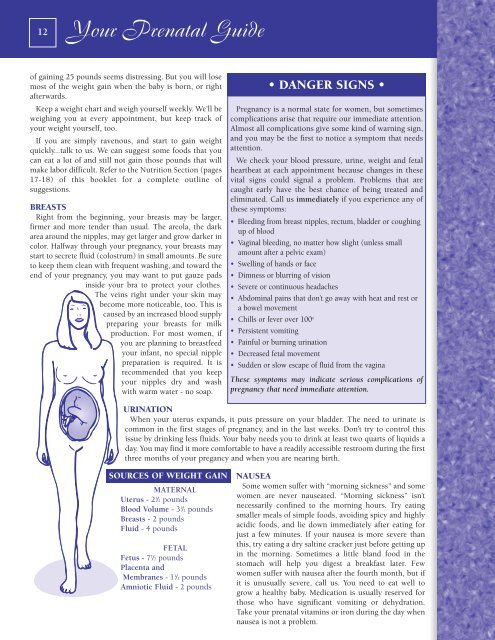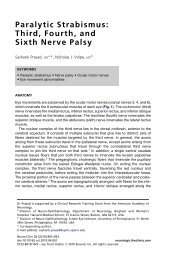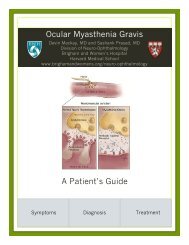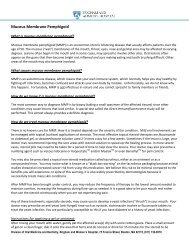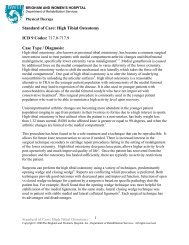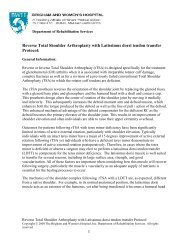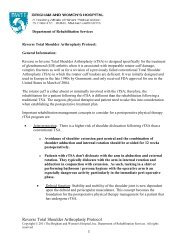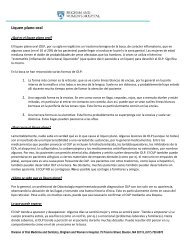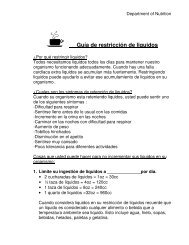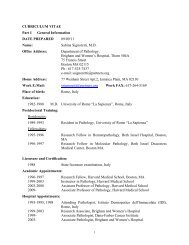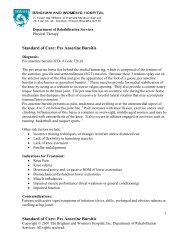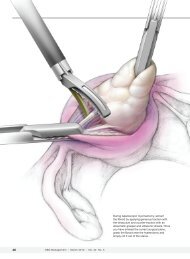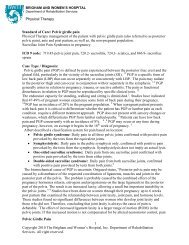Enjoying Your Pregnancy Guide to Understanding - Brigham and ...
Enjoying Your Pregnancy Guide to Understanding - Brigham and ...
Enjoying Your Pregnancy Guide to Understanding - Brigham and ...
Create successful ePaper yourself
Turn your PDF publications into a flip-book with our unique Google optimized e-Paper software.
12<br />
<strong>Your</strong> Prenatal <strong>Guide</strong><br />
of gaining 25 pounds seems distressing. But you will lose<br />
most of the weight gain when the baby is born, or right<br />
afterwards.<br />
Keep a weight chart <strong>and</strong> weigh yourself weekly. We’ll be<br />
weighing you at every appointment, but keep track of<br />
your weight yourself, <strong>to</strong>o.<br />
If you are simply ravenous, <strong>and</strong> start <strong>to</strong> gain weight<br />
quickly...talk <strong>to</strong> us. We can suggest some foods that you<br />
can eat a lot of <strong>and</strong> still not gain those pounds that will<br />
make labor difficult. Refer <strong>to</strong> the Nutrition Section (pages<br />
17-18) of this booklet for a complete outline of<br />
suggestions.<br />
BREASTS<br />
Right from the beginning, your breasts may be larger,<br />
firmer <strong>and</strong> more tender than usual. The areola, the dark<br />
area around the nipples, may get larger <strong>and</strong> grow darker in<br />
color. Halfway through your pregnancy, your breasts may<br />
start <strong>to</strong> secrete fluid (colostrum) in small amounts. Be sure<br />
<strong>to</strong> keep them clean with frequent washing, <strong>and</strong> <strong>to</strong>ward the<br />
end of your pregnancy, you may want <strong>to</strong> put gauze pads<br />
inside your bra <strong>to</strong> protect your clothes.<br />
The veins right under your skin may<br />
become more noticeable, <strong>to</strong>o. This is<br />
caused by an increased blood supply<br />
preparing your breasts for milk<br />
production. For most women, if<br />
you are planning <strong>to</strong> breastfeed<br />
your infant, no special nipple<br />
preparation is required. It is<br />
recommended that you keep<br />
your nipples dry <strong>and</strong> wash<br />
with warm water - no soap.<br />
• DANGER SIGNS •<br />
URINATION<br />
When your uterus exp<strong>and</strong>s, it puts pressure on your bladder. The need <strong>to</strong> urinate is<br />
common in the first stages of pregnancy, <strong>and</strong> in the last weeks. Don’t try <strong>to</strong> control this<br />
issue by drinking less fluids. <strong>Your</strong> baby needs you <strong>to</strong> drink at least two quarts of liquids a<br />
day. You may find it more comfortable <strong>to</strong> have a readily accessible restroom during the first<br />
three months of your pregancy <strong>and</strong> when you are nearing birth.<br />
SOURCES OF WEIGHT GAIN<br />
MATERNAL<br />
Uterus - 2 1 /2 pounds<br />
Blood Volume - 3 1 /2 pounds<br />
Breasts - 2 pounds<br />
Fluid - 4 pounds<br />
FETAL<br />
Fetus - 7 1 /2 pounds<br />
Placenta <strong>and</strong><br />
Membranes - 1 1 /2 pounds<br />
Amniotic Fluid - 2 pounds<br />
<strong>Pregnancy</strong> is a normal state for women, but sometimes<br />
complications arise that require our immediate attention.<br />
Almost all complications give some kind of warning sign,<br />
<strong>and</strong> you may be the first <strong>to</strong> notice a symp<strong>to</strong>m that needs<br />
attention.<br />
We check your blood pressure, urine, weight <strong>and</strong> fetal<br />
heartbeat at each appointment because changes in these<br />
vital signs could signal a problem. Problems that are<br />
caught early have the best chance of being treated <strong>and</strong><br />
eliminated. Call us immediately if you experience any of<br />
these symp<strong>to</strong>ms:<br />
• Bleeding from breast nipples, rectum, bladder or coughing<br />
up of blood<br />
• Vaginal bleeding, no matter how slight (unless small<br />
amount after a pelvic exam)<br />
• Swelling of h<strong>and</strong>s or face<br />
• Dimness or blurring of vision<br />
• Severe or continuous headaches<br />
• Abdominal pains that don’t go away with heat <strong>and</strong> rest or<br />
a bowel movement<br />
• Chills or fever over 100o • Persistent vomiting<br />
• Painful or burning urination<br />
• Decreased fetal movement<br />
• Sudden or slow escape of fluid from the vagina<br />
These symp<strong>to</strong>ms may indicate serious complications of<br />
pregnancy that need immediate attention.<br />
NAUSEA<br />
Some women suffer with “morning sickness" <strong>and</strong> some<br />
women are never nauseated. “Morning sickness” isn’t<br />
necessarily confined <strong>to</strong> the morning hours. Try eating<br />
smaller meals of simple foods, avoiding spicy <strong>and</strong> highly<br />
acidic foods, <strong>and</strong> lie down immediately after eating for<br />
just a few minutes. If your nausea is more severe than<br />
this, try eating a dry saltine cracker just before getting up<br />
in the morning. Sometimes a little bl<strong>and</strong> food in the<br />
s<strong>to</strong>mach will help you digest a breakfast later. Few<br />
women suffer with nausea after the fourth month, but if<br />
it is unusually severe, call us. You need <strong>to</strong> eat well <strong>to</strong><br />
grow a healthy baby. Medication is usually reserved for<br />
those who have significant vomiting or dehydration.<br />
Take your prenatal vitamins or iron during the day when<br />
nausea is not a problem.


